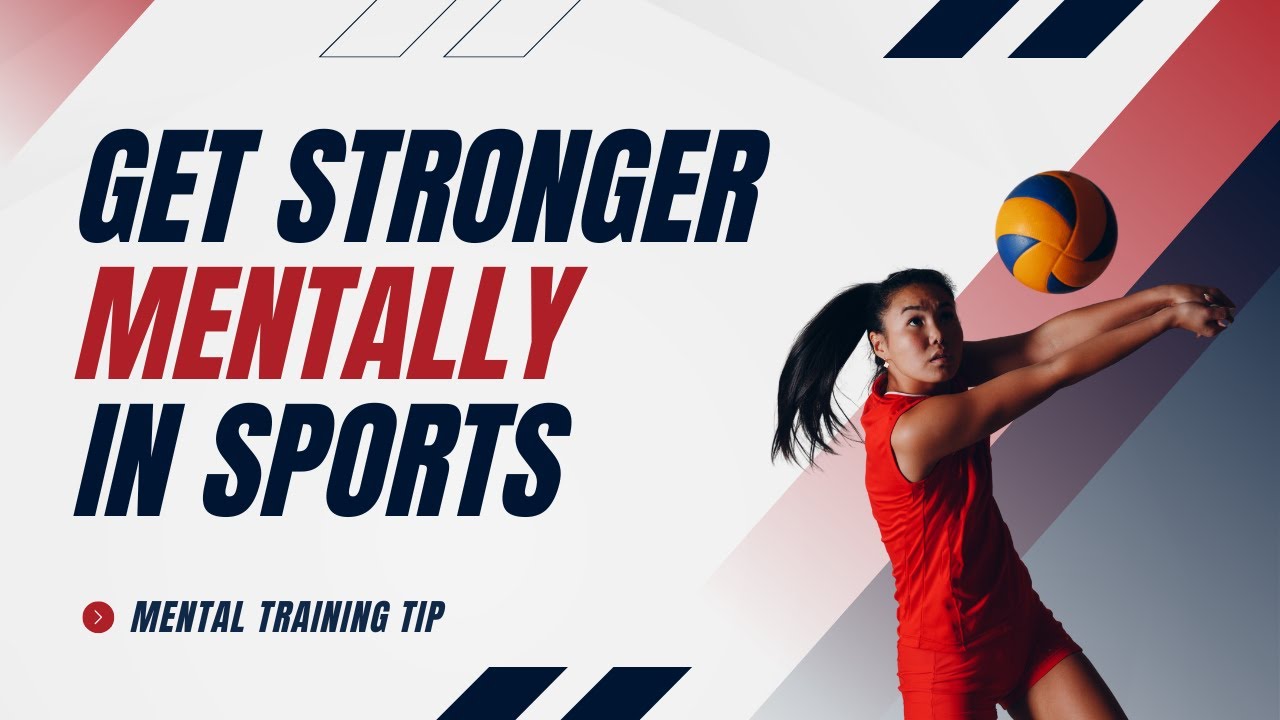To excel in volleyball, mental strength is crucial. It helps you stay focused and resilient during tough matches.
Playing volleyball is not just about physical skills. Mental toughness is a key factor that separates good players from great ones. It helps you handle pressure, stay confident, and recover from mistakes quickly. In this blog post, we will explore ways to build mental strength specifically for volleyball.
Whether you are a beginner or an experienced player, these tips will help improve your game and boost your confidence on the court. Let’s dive into how you can become mentally strong and dominate in volleyball.

Credit: www.championshipproductions.com
Contents
Importance Of Mental Strength
Mental strength is vital for volleyball players. It helps in staying focused during matches. Strong mental skills can improve performance and help handle pressure.
Impact On Performance
Mental strength directly affects how you play. It keeps your mind sharp and ready. Players with strong minds make better decisions. They stay calm under pressure. This leads to fewer mistakes and better game outcomes.
Building Resilience
Resilience helps players bounce back from setbacks. It builds the ability to recover from losses. Strong mental skills help maintain a positive attitude. This is key in turning failures into learning experiences. Resilient players keep pushing, no matter the challenge.
Setting Goals
Setting goals is crucial for mental strength in volleyball. Goals give direction and purpose. They help you stay focused and motivated. In this section, we will discuss short-term and long-term goals.
Short-term Goals
Short-term goals are achievable within a short period. They can be daily or weekly. These goals help you improve specific skills. For example, aim to improve your serve accuracy. Another short-term goal could be mastering a new volleyball technique. These small achievements build confidence. They also keep you motivated for bigger challenges.
Long-term Goals
Long-term goals take more time to achieve. They might span over months or even years. These goals are essential for overall growth. An example of a long-term goal is becoming a team captain. Another long-term goal could be getting a college scholarship. Setting long-term goals requires patience and dedication. They give you a clear vision of your future in volleyball. Both short-term and long-term goals work together. They help you stay focused and mentally strong.
Visualization Techniques
Hey volleyball enthusiasts! Looking to boost your mental game? Visualization techniques can help. These methods allow you to imagine scenarios in your mind, preparing you for real-life situations. It’s like a rehearsal for your brain. Let’s dive into some key visualization techniques to help you get mentally strong for volleyball.
Imagining Success
Ever dream of making that perfect spike or block? Visualization can make it happen. Close your eyes and picture yourself playing your best game. Imagine every detail:
- The sound of the ball hitting your hand
- The cheers from the crowd
- Your teammates celebrating with you
This mental practice builds confidence. The more you see yourself succeed, the more likely you are to do it in real life. It’s like a movie in your mind, where you are the star. Try it before your next game. Take a few minutes to visualize your success. Feel the excitement and pride. It will pump you up!
Overcoming Challenges
But what about tough times? Visualization helps here too. Picture a challenging scenario. Maybe you missed a serve or made a mistake. Now, imagine how you will handle it:
- Take a deep breath
- Stay calm and focused
- Visualize your next move
By doing this, you prepare your mind to stay cool under pressure. You create a mental plan for handling setbacks. This makes it easier to bounce back. Trust me, I’ve been there. I once missed a crucial serve in a tournament. But thanks to visualization, I stayed composed and nailed the next one. It works!
So, start using visualization techniques today. Imagine your success. Prepare for challenges. Your mind is a powerful tool. Use it to become a mentally strong volleyball player.
Stress Management
Playing volleyball requires not just physical strength but also mental fortitude. Stress management is crucial for maintaining peak performance on the court. Effective stress management can help you stay calm, focused, and confident during matches. It can also improve your overall well-being. Here, we explore some relaxation methods and breathing exercises to help you manage stress.
Relaxation Methods
Relaxation methods can help you calm your mind and body. One effective method is progressive muscle relaxation. Start by tensing and then relaxing each muscle group. Begin with your toes and work your way up to your head. This technique helps release physical tension.
Another method is visualization. Close your eyes and imagine a peaceful scene. Picture yourself in a place where you feel safe and relaxed. This can be a beach, a forest, or any place you love. Visualization can help you feel more at ease and reduce stress.
Breathing Exercises
Breathing exercises can be powerful tools for stress management. One simple exercise is deep breathing. Sit or lie down in a comfortable position. Place one hand on your chest and the other on your belly. Take a slow, deep breath in through your nose. Feel your belly rise as you fill your lungs with air.
Next, exhale slowly through your mouth. Feel your belly fall as you release the air. Repeat this for several minutes. Deep breathing can help lower your heart rate and calm your mind.
Another helpful exercise is box breathing. Breathe in slowly for four counts. Hold your breath for four counts. Exhale slowly for four counts. Then hold your breath again for four counts. Repeat this cycle several times. Box breathing can help you regain control and reduce anxiety.
Positive Self-talk
Build mental strength for volleyball with positive self-talk. Encourage yourself with affirmations and boost confidence. Stay focused and resilient on the court.
Positive self-talk is a powerful tool for athletes. It helps build confidence and mental strength. This is crucial for volleyball players. Encouraging yourself can improve your performance. It keeps your mind focused and determined.Affirmations
Affirmations are positive statements. They help you believe in your abilities. Say things like, “I am a strong player.” Repeat these statements daily. They can boost your confidence. Affirmations remind you of your strengths.Replacing Negativity
Negative thoughts can harm your performance. Replace them with positive ones. If you think, “I can’t do this,” change it to, “I will try my best.” This shift in mindset is crucial. It keeps you motivated and focused. Practicing this daily can make a big difference. Remember, positive self-talk is a habit. It takes time to develop. But with practice, it can make you mentally strong for volleyball. “`
Credit: www.betteratbeach.com
Focus And Concentration
Focus and concentration are crucial for success in volleyball. Staying mentally strong enables you to make quick decisions and react swiftly. By honing your focus, you can improve your game and perform at your best.
Eliminating Distractions
Distractions can disrupt your focus during practice and matches. Identify common distractions and create strategies to avoid them. Turn off your phone or set it to airplane mode. Inform friends and family not to interrupt during practice. Create a dedicated space for volleyball training, free of clutter and noise.
Mindfulness Practices
Mindfulness helps you stay present and focused on the task at hand. Practice deep breathing exercises to calm your mind. Spend a few minutes each day meditating to enhance your concentration. Visualization techniques can also boost your focus. Picture yourself performing well on the court. This mental rehearsal can improve your confidence and readiness.
Building Confidence
Confidence is crucial for volleyball players. It helps them face challenges and perform well. Building confidence takes effort and time. It involves celebrating small wins and learning from mistakes. Let’s explore these two areas.
Celebrating Small Wins
Small wins matter. They build momentum and boost morale. Recognize every successful serve, block, or pass. Each small victory adds up. It strengthens your belief in your abilities. Share your small wins with teammates. This creates a positive environment. It encourages everyone to keep pushing forward.
Track your progress. Keep a journal of your achievements. Review it often. This helps you see how far you’ve come. It reminds you of your growth. Celebrate small wins regularly. It keeps your spirits high. It motivates you to achieve bigger goals.
Learning From Mistakes
Mistakes happen. They are part of the learning process. Embrace them. Each mistake offers a lesson. Analyze what went wrong. Identify areas for improvement. This helps you grow stronger mentally.
Don’t dwell on errors. Move on quickly. Focus on the next play. Use mistakes as stepping stones. They can lead to better performance. Discuss mistakes with your coach. Get feedback. Apply the lessons learned in practice. This builds resilience. It prepares you for future challenges.
Learning from mistakes is essential. It helps you improve. It boosts your confidence over time. Remember, every mistake is an opportunity. An opportunity to become a better volleyball player.
Team Dynamics
Hey there, volleyball enthusiasts! Today, we’re diving into an important aspect of becoming mentally strong for volleyball: team dynamics. This is all about how you and your teammates interact with each other on and off the court. Good team dynamics can boost your performance, while poor team dynamics can drag you down. Let’s explore how you can make sure your team is working like a well-oiled machine.
Effective Communication
One of the keys to great team dynamics is effective communication. It’s not just about shouting “mine!” when you’re going for the ball. It’s about understanding and being understood. Here are some simple tips to improve communication:
- Listen Actively: Pay attention when your coach or teammates are speaking. Nod or give a thumbs up to show you’re engaged.
- Be Clear and Concise: Use simple language and short sentences. For example, instead of saying, “I think I might be able to get the ball,” say, “I got it!”
- Non-verbal Cues: Use gestures and facial expressions. A smile or a thumbs-up can go a long way.
When I played volleyball in high school, we had a rule: before every play, we made eye contact with at least one teammate. It helped us feel connected and ready.
Supporting Teammates
Supporting your teammates is another critical part of strong team dynamics. When you support each other, everyone feels more confident and plays better. Here’s how you can be a supportive teammate:
- Encourage Each Other: Simple words like “great job” or “you can do it” can lift someone’s spirits. I remember a game where I missed a serve, and my teammate just said, “Shake it off, we got this.” It made a huge difference.
- Help Each Other Improve: Offer constructive feedback. For example, if a teammate is struggling with serves, you might say, “Try tossing the ball a bit higher.” Just make sure to be kind and positive.
- Celebrate Wins Together: Whether you win a match or someone makes an amazing save, celebrate it. High-fives, fist bumps, or even a team cheer can build camaraderie.
Remember, volleyball is a team sport. Your success depends on how well you work together. By improving communication and supporting your teammates, you’ll not only become mentally stronger but also make your team unstoppable.
Routine And Consistency
Establishing a routine and maintaining consistency are key to building mental strength for volleyball. These elements help create a stable environment that fosters growth and resilience. By sticking to a well-planned schedule, athletes can develop habits that enhance their performance and mental fortitude.
Daily Habits
Start your day with a positive mindset. A morning routine sets the tone for the day. This could include a quick workout, meditation, or a healthy breakfast. Consistent sleep patterns also contribute to mental clarity. Aim for 7-9 hours of sleep each night. Journaling your thoughts and goals can help keep your focus sharp.
Hydration and nutrition play vital roles. Drink plenty of water and eat balanced meals. These habits ensure your body and mind function at their best. Take short breaks during the day. This practice prevents burnout and keeps your energy levels high.
Practice Schedules
Regular practice strengthens both skills and mental toughness. Create a weekly practice schedule and stick to it. Consistency in training builds muscle memory and confidence. Start with warm-ups to prepare your body and mind. Follow with drills that challenge your skills.
Set specific goals for each practice session. This focus helps measure progress and keeps motivation high. Include mental exercises in your practice. Visualization and mindfulness techniques can enhance performance under pressure. Review your performance after each session. Reflecting on what went well and what can improve is crucial.

Credit: www.youtube.com
Frequently Asked Questions
How To Be Mentally Strong In Volleyball?
Stay focused on the game. Practice mindfulness and deep breathing. Set achievable goals. Maintain a positive mindset. Visualize success.
How Can Volleyball Improve Mental Health?
Volleyball boosts mental health by reducing stress, increasing endorphins, and improving focus. It fosters social connections and enhances mood.
How To Not Be Nervous For Volleyball?
Practice regularly, focus on deep breathing, visualize success, stay positive, and trust your skills.
Is Volleyball The Hardest Sport Mentally?
Volleyball requires strong mental focus, quick decision-making, and teamwork. While challenging, its mental difficulty varies per individual.
Conclusion
Building mental strength for volleyball takes practice and dedication. Focus on your goals. Stay positive, even during tough times. Visualize success to boost confidence. Practice mindfulness to stay calm under pressure. Remember, every player faces challenges. Learn from setbacks and keep improving.
Support from teammates is crucial. Keep communication open and encourage each other. Consistency is key, so stick to your routine. You’ll see progress with patience and hard work. Stay mentally strong, and enjoy the game!

